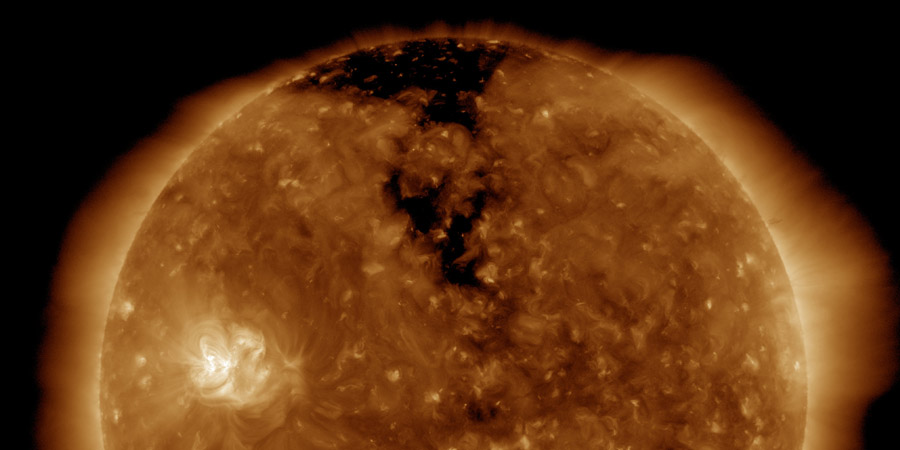Quiet space weather, Coronal hole
Saturday, 16 June 2018 09:46 UTC

The beginning of June has been very quiet when it comes to space weather. While we did reach minor G1 geomagnetic storm conditions back on the very first day of this month, no other space weather events have occurred which are worth mentioning. The solar wind conditions at Earth have been very underwhelming for a while now and the Sun has also been very quiet as we are starting to reach solar minimum conditions. That said, our automated coronal hole detection system spotted an opening in the corona yesterday. A southern extension of the northern hemisphere polar coronal hole was facing our planet today.
A northern hemisphere coronal hole is facing Earth. Enhanced solar wind could arrive in ~3 days. Follow live on https://t.co/bsXLidnzGh pic.twitter.com/6Yf2WYeVvU
— SpaceWeatherLive (@_SpaceWeather_) June 15, 2018
As you can see, it is only a very minor opening that stretches southward from the northern hemisphere polar coronal hole but it was enough to trigger the detector. A minor solar wind enhancement is possible based on STEREO Ahead data with the solar wind speed topping out somewhere between 400 and 500km/s and the total strength of the interplanetary magnetic field (Bt) could increase to a maximum of 10nT. No numbers to get terribly excited about but if you are a high latitude sky watcher not plagued by the midnight sun like our friends over in the southern hemisphere, it might be worth your time to stay alert around 18 (Monday) and 19 (Tuesday) June. Kp3 (unsettled conditions) are possible with a slight chance of active geomagnetic conditions which stands for a Kp on 4.
Thank you for reading this article! Did you have any trouble with the technical terms used in this article? Our help section is the place to be where you can find in-depth articles, a FAQ and a list with common abbreviations. Still puzzled? Just post on our forum where we will help you the best we can!
Latest news
Latest forum messages
Support SpaceWeatherLive.com!
A lot of people come to SpaceWeatherLive to follow the Solar activity or if there is a chance to see the aurora, but with more traffic comes higher costs to keep the servers online. If you like SpaceWeatherLive and want to support the project you can choose a subscription for an ad-free site or consider a donation. With your help we can keep SpaceWeatherLive online!
Space weather facts
| Last X-flare | 2025/12/08 | X1.1 |
| Last M-flare | 2025/12/31 | M7.11 |
| Last geomagnetic storm | 2026/01/02 | Kp5 (G1) |
| Spotless days | |
|---|---|
| Last spotless day | 2022/06/08 |
| Monthly mean Sunspot Number | |
|---|---|
| December 2025 | 124 +32.2 |
| January 2026 | 111.2 -12.8 |
| Last 30 days | 105.1 -4.2 |





